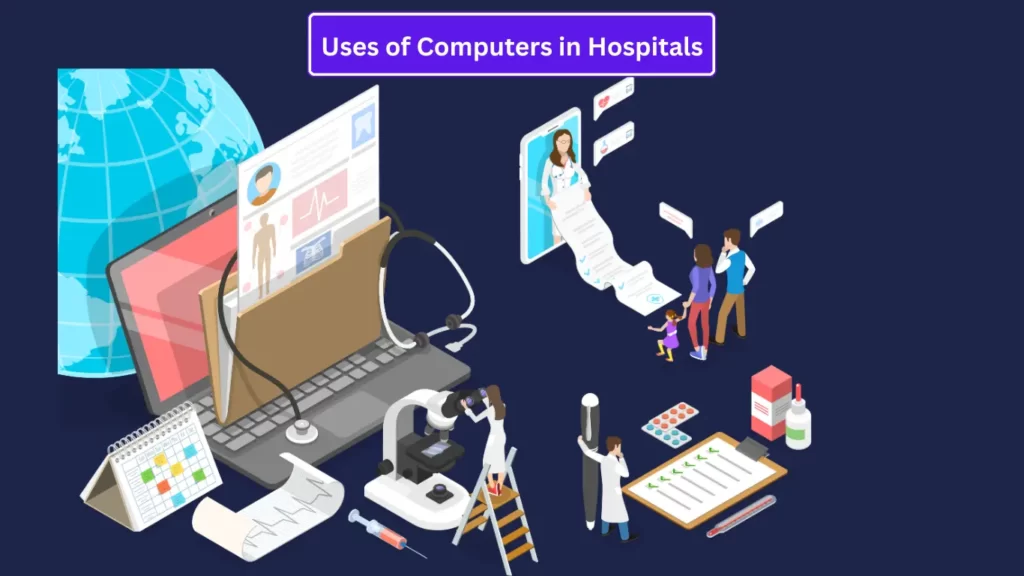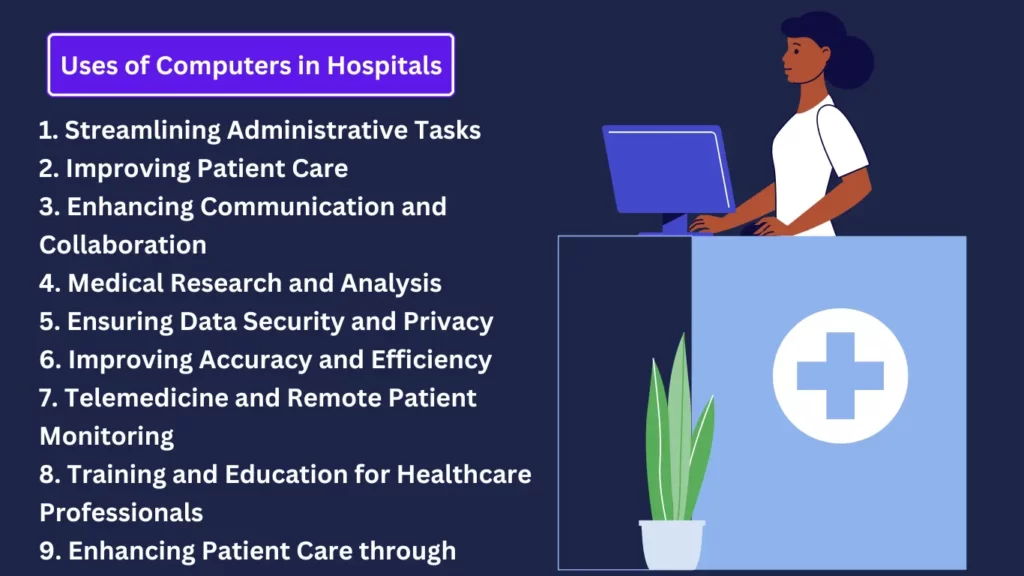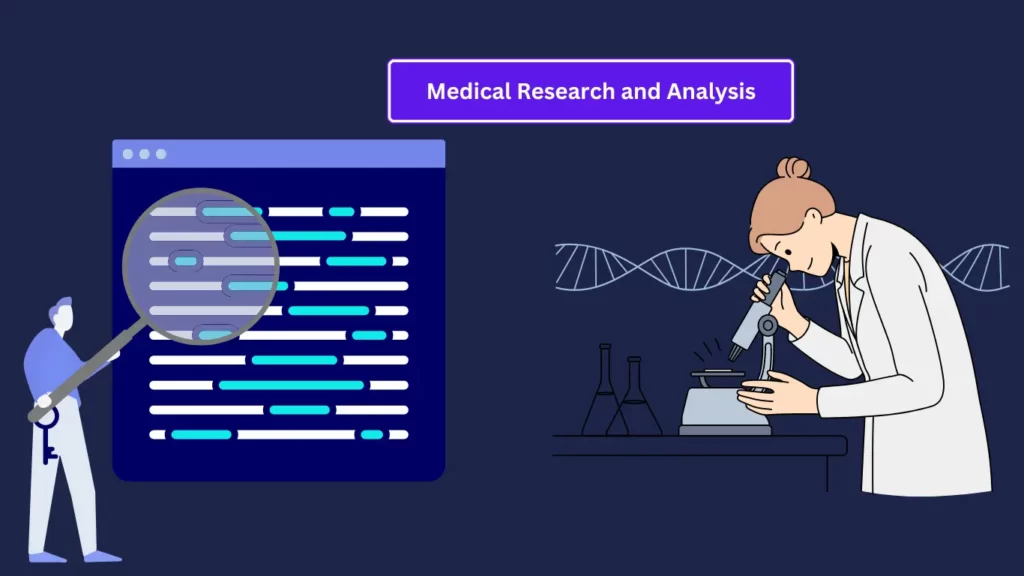Uses of Computers in Hospitals: Computers have become an indispensable tool in the medical field, revolutionizing the way we deliver healthcare services.

In this article, we will explore the 5+ essential uses of computers in hospitals, ranging from streamlining administrative tasks to improving patient care and advancing medical research.
Uses of Computer in Hospital | Use of Computer in Hospital

1. Streamlining Administrative Tasks
Computers have brought about a significant shift in the way hospitals handle administrative tasks. With the aid of specialized software and electronic databases, healthcare professionals can now efficiently manage patient records, schedule appointments, and handle billing and insurance claims.
With the help, of computerized administrative systems can automation of routine tasks. The computer allows healthcare providers to allocate more time and resources toward direct patient care. By eliminating paperwork and manual data entry, computers streamline processes and reduce the risk of errors.
2. Improving Patient Care
With the help of computers, the advent of electronic medical records (EMRs) has revolutionized hospital patient care. EMRs are digital versions of traditional paper-based medical records, providing healthcare providers with comprehensive and up-to-date patient information.
One of the most significant advantages of EMRs is the ability to share patient information seamlessly. With the click of a button, healthcare providers can access a patient’s medical history, test results, and treatment plans.
3. Enhancing Communication and Collaboration
Computers play a crucial role in fostering collaboration by providing a platform for seamless communication and information sharing. Collaboration and effective communication are vital in a hospital setting, where numerous healthcare professionals work together to deliver comprehensive care.
The use of computers for communication in hospitals is through electronic messaging systems. Healthcare professionals can communicate securely, exchange patient information, and discuss treatment plans in a digital environment.
For example, multidisciplinary teams can access and update patient records simultaneously, ensuring that everyone involved in the care process is well-informed. This collaborative approach leads to improved patient outcomes, as it allows for a comprehensive and holistic approach to healthcare delivery.
4. Medical Research and Analysis
With the help of computers, Medical research, and analysis are at the forefront of advancements in healthcare. Computers have become indispensable tools for researchers, enabling them to collect, analyze, and interpret vast amounts of data.
Data mining is One of the primary uses of computers in medical research. With the power of computers, Researchers can analyze large datasets to identify patterns, correlations, and potential risks. This helps in understanding disease mechanisms, identifying risk factors, and developing targeted interventions.

Computers also play a crucial role in medical imaging and diagnostics. Advanced imaging techniques, such as magnetic resonance imaging (MRI) and computed tomography (CT), generate highly detailed images that can be analyzed using specialized software.
5. Ensuring Data Security and Privacy
With the increasing reliance on computers and digital systems in healthcare, ensuring data security and privacy has become paramount. Hospitals handle sensitive patient information, and any breach of security can have severe consequences. Therefore, robust measures must be in place to protect patient data from unauthorized access or theft.
Encryption is one of the key tools used to safeguard patient information. By encrypting data, it becomes unreadable to unauthorized individuals, even if they gain access to it. This ensures that patient records are secure, both during transmission and storage.
With the help of computers, Hospitals must regularly review their systems, identify vulnerabilities, and implement necessary updates and patches. Additionally, staff training and awareness programs are vital in educating healthcare professionals about data security best practices and the importance of safeguarding patient information.
6. Improving Accuracy and Efficiency
Computers have revolutionized the field of diagnostics and treatment, significantly improving accuracy and efficiency. Advanced computer algorithms and machine learning techniques have made it possible to analyze complex medical data and provide accurate diagnoses.
Computer-aided detection (CAD) is One of the key applications of computers in diagnostics. CAD systems analyze medical images, such as X-rays or mammograms, and highlight potential areas of concern. This assists healthcare professionals in identifying abnormalities or early signs of disease, leading to timely intervention and improved patient outcomes.
Computers also play a crucial role in treatment planning and monitoring. Healthcare professionals can use computer simulations and modeling to develop personalized treatment plans based on individual patient characteristics. This allows for more targeted and effective interventions, minimizing the risk of complications.
7. Telemedicine and Remote Patient Monitoring
With the help of computers, The COVID-19 pandemic has highlighted the importance of telemedicine and remote patient monitoring. Computers have become instrumental in enabling virtual consultations and monitoring patients from the comfort of their homes.
Telemedicine allows healthcare professionals to provide care remotely, eliminating the need for in-person visits. Patients can consult with their healthcare providers through video calls, discussing their symptoms, and receiving medical advice.
Remote patient monitoring involves the use of computers and wearable devices to track patients’ vital signs and health parameters. This data is transmitted to healthcare providers, who can monitor patients’ health status and intervene if necessary.
8. Training and Education for Healthcare Professionals
As computers become increasingly integral to healthcare delivery, it is essential to provide adequate training and education to healthcare professionals. This ensures that they are proficient in using computer systems and can harness the full potential of technology in their practice.

With the help of computers, Hospitals, and healthcare organizations offer training programs and workshops to familiarize healthcare professionals with computer systems and software. These programs cover electronic medical records, data security, and specialized medical software. By equipping healthcare professionals with the necessary skills, hospitals can maximize the benefits of computer technology and deliver high-quality care.
9. Enhancing Patient Care through Electronic Health Records
Electronic health records (EHRs) are a comprehensive digital record of a patient’s health information. EHRs go beyond medical records by including information from various healthcare providers, enabling a complete overview of a patient’s health history.
By utilizing EHRs, healthcare professionals can make more informed decisions and provide personalized care. EHRs contain a wealth of information, including medical history, allergies, medications, and test results. This comprehensive overview allows healthcare professionals to identify potential risks, avoid medication errors, and tailor treatment plans to individual patients.
Conclusion: Uses of Computers in Hospitals
Computers have revolutionized the healthcare industry, unlocking new possibilities and improving patient care. From streamlining administrative tasks to enhancing communication among healthcare professionals, the uses of computers in hospitals are vast and varied.
Healthcare professionals must embrace technology and adapt to the ever-changing digital healthcare environment. By harnessing the power of computers, we can improve patient outcomes, enhance efficiency, and deliver high-quality care. The future of technology in hospitals is bright, and it holds immense potential for transforming healthcare delivery.